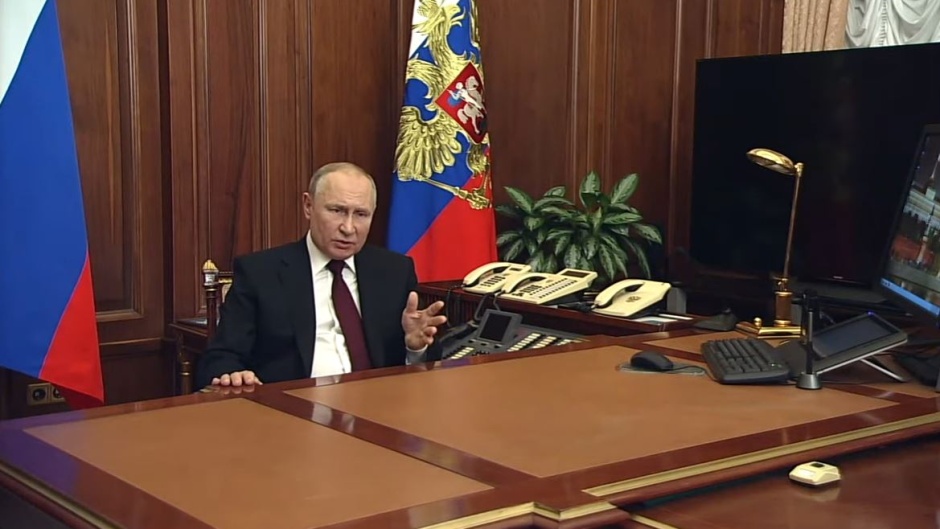Putin sends troops into the Ukrainian territory after the Russian parliament recognises the ‘oblasts’ of Donetsk and Luhansk as independent territories. Europe responds with financial sanctions. Evangelicals pray for wisdom for the next days.
 President of Russia, Vladimir Putin, in the speech of 21 February 2022 in which he justified the recognition of Ukrainian separatist regions Donetsk and Luhansk as independent territories. / Image taken from official adress.
President of Russia, Vladimir Putin, in the speech of 21 February 2022 in which he justified the recognition of Ukrainian separatist regions Donetsk and Luhansk as independent territories. / Image taken from official adress.
In a long and hostile speech on the night of 21 February 2022, Vladimir Putin confirmed that Russian troops would cross the Ukrainian border.
The “peacekaming” military units will cross the Ukrainian territory breaking international law, after the Duma (Russia’s parliament) approved the official recognition of the Oblasts (provinces) of Donetsk and Luhansk as “independent” territories. This includes regions that are not controlled by pro-Russian separatists.
Putin said the Minsk Protocols, which aimed for a ceasefire in Eastern Ukraine, “no longer exist”.
Ukraine’s President Volodymyr Zelensekyy responded saying the country’s army is ready to respond to an invasion as hundreds of thousands of reservists are to be conscripted. A 30-day state of emergency was announced on 23 February.
He said Ukraine “fears nothing and no-one” as he urged Western countries to clearly express their support as a total war scenario becomes more plausible. The “violation of sovereignty and territorial integrity” cannot be combated with “words”, he said.
In an urgent meeting of the United Nations Security Council, all countries except Russia demanded called the Moscow government to stop the escalation.
Both European Union representatives and national governments have already announced financial sanctions against Russian banks and members of the Russian political elites, adding that more sanctions could be announced in the days to come. Words as “unacceptable” and “incomprehensible” were used by presidents and prime ministers of several European countries.
Germany’ Chancellor Olaf Scholz announced it had halted the certification of the strategic Nord Stream 2 gas pipeline that was to be a major agreement with Russia.
Meanwhile, NATO member nations sent more military gear to Ukraine as United States troops moved to bases in Eastern Europe.
From the United States, President Joe Biden said a meeting with Vladimir Putin to de-escalate the tensions was no longer an option. Australia and New Zealand called in ambassadors in Moscow and Japan and Canada also imposed economic sanctions against Russia.
One week ago, a pastor of a large evangelical church in Kharkiv, one hour’s drive from the Russia border, told Evangelical Focus he tried to not be intimidated by the news. “Most churches keep on encouraging people to believe, to stay calm”, he said. Most people in Eastern Ukraine, “keep hope and faith to stay here”. He asked to pray for Ukraine and that “we will continue to share the Gospel without any fear”.
Evangelical bodies both in Russia and Ukraine had also expressed their strong conviction that a full-scale conflict could be avoided.
In the last hours, representatives of evangelical platforms on an European level expressed their worries. The Brussels Representative of the European Evangelical Alliance, Arie de Pater, said: “Russia and Ukraine are sovereign nations that must respect each other’s borders and internal and geopolitical affairs”.
The Co-Chair of the Lausanne Movement Europe, Jim Memory, wrote: “Join me in praying for Ukraine and that European leaders respond wisely and proportionately”.
Deeply distressed by the Russian military sent into the autonomous regions #Luhansk and #Donbass in #Ukraine. Russia and Ukraine are sovereign nations that must respect each other’s borders and internal and geopolitical affairs. #UkraineRussiaCrisis
— Arie de Pater (@ariedep) February 22, 2022
22 02 2022 is memorable and it will be a date that history will remember as the day Russia invaded Ukraine. Join me in praying for Ukraine and that European leaders respond wisely and proportionately. #ukraine
— Jim Memory (@jimmemory) February 22, 2022
[donate]

Las opiniones vertidas por nuestros colaboradores se realizan a nivel personal, pudiendo coincidir o no con la postura de la dirección de Protestante Digital.
Si quieres comentar o